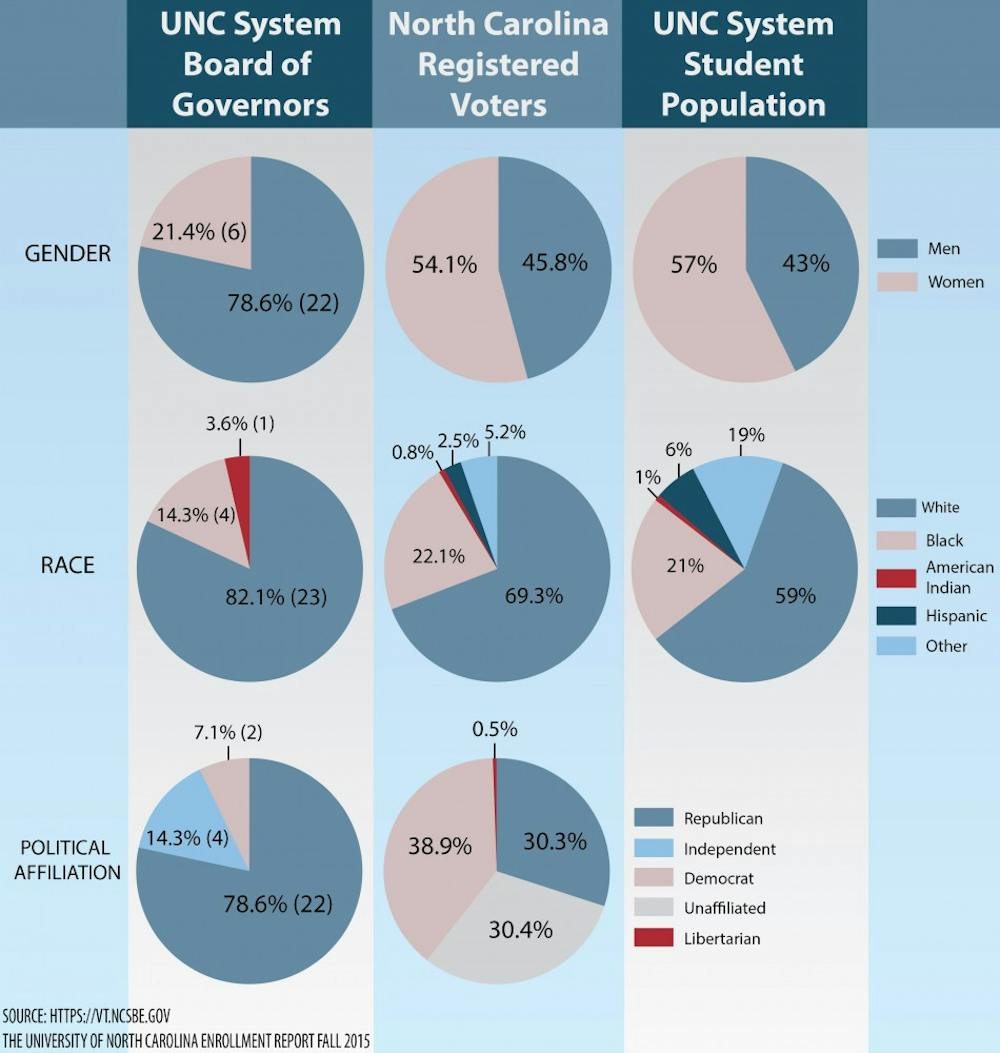Two registered Democrats currently sit on the Board: Kellie Hunt Blue and Walter Davenport.
A law shrinking the BOG from 32 members to 24 was passed in March. The Board's streamlining was meant to make it more efficient.
Hannah Gage, a former Board member, said in a February op-ed for Wilmington StarNews Media that the size of the Board had never been a problem. She said the real problem is the BOG acting as an extension of the General Assembly.
"It will not have escaped anyone’s notice ... that since Republicans took control of the General Assembly in 2010, a systematic partisan purge of the UNC Board of Governors has been underway," Gage wrote in her op-ed.
She also said the lack of diversity on the Board would be exacerbated by the shrink.
"There are many good and well-intentioned legislators, but the best intentions of a white male, Democrat or Republican, can never replicate the life experience and perspective of a female or a minority Board member," she said. "The best public policy decisions involve more voices, not fewer."
Eighteen white, Republican men sit on the Board of Governors.
Candidates are sponsored by legislators who then rally votes from fellow legislators. After vetting potential members, the legislature votes.
The “real election” occurs in conversations within the Republican caucus as they decide which candidates to support, Meyer said.
Despite stark party divisions in both the BOG and legislature, N.C. Rep. Verla Insko, D-Orange, said she does not remember any controversy during the 2017 Board election.
“Most nominees have bipartisan support," Insko said.
In April, eight new members were elected — five were Republican men. Four incumbent members were re-elected — all white, Republican men. Three incumbents were not re-elected: two Republicans and one Democrat.
To get the day's news and headlines in your inbox each morning, sign up for our email newsletters.
“The Republicans have a majority that is large enough that they can elect who they want to elect,” Meyer said.
Business experience is prominent among the 28 Board members: R. Doyle Parrish is the CEO of Summit Hospitality Group; Marty Kotis is a commercial developer in Greensboro; Harry Smith was the CEO of Flanders Corporation.
“I think that what you see there is a reflection of the Republican priorities,” Meyer said. “That they believe business experience is qualification for other types of leadership including educational leadership.”
Dr. Joan Perry, a former BOG member who was voted out this year, said she understood the legislature's want for different perspectives, including the business perspective.
“A lot of the decision making is related to business,” Perry said. “With a Board that large, you would expect to have diversity that would contribute to policy-making and a lot of areas outside of the business area.”
Several members of the BOG are former Republican legislators and lobbyists. Robert Rucho was a Republican state senator for over a decade. Tom Fetzer is the founder and president of Fetzer Strategic Partners, a Raleigh-based lobbying firm. Fetzer was the first Republican mayor of Raleigh and chairperson of the N.C. Republican Party.
Connections to the NCGA help potential members obtain votes they need to become members, said Paul Fulton, co-chairperson of Higher Education Works and a former BOG member.
Fulton said he used his connections with people in the legislature to get support from both sides of the aisle when he was seeking a position on the BOG.
Fulton served for one term. He was voted out after the legislators who supported him left the NCGA, he said.
“They just wanted to go to their own people,” Fulton said. “I had been supported by people who were no longer in the legislature.”
Meyer said he voted for Republicans because he knew them from working in the legislature.
"I think I voted for former representative Leo Daughtry, who is a Republican," he said. "But I knew from working with him in the legislature that he really respects and appreciates our University."
Meyer said he looked for people that would be fair — regardless of party affiliation.
“I believe that governmental boards should at least make a good attempt to represent the people they are meant to serve in terms of both race and gender.”
@ky__marsh
state@dailytarheel.com




